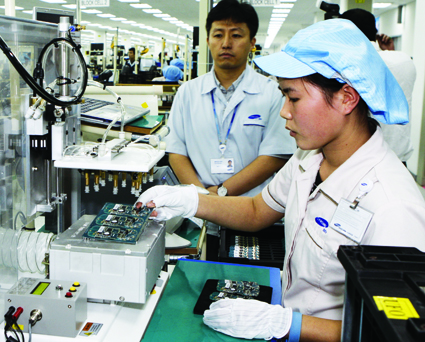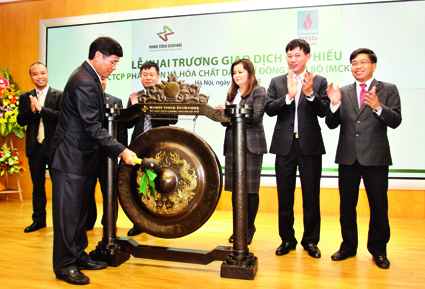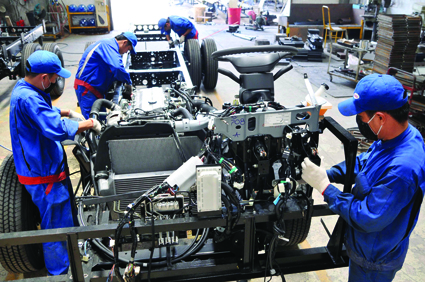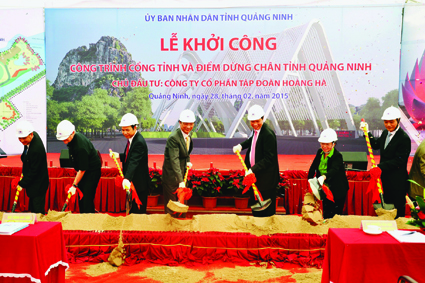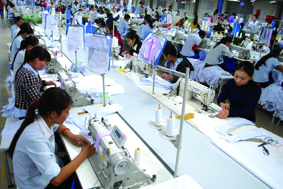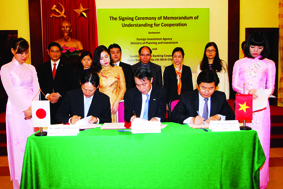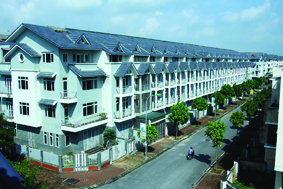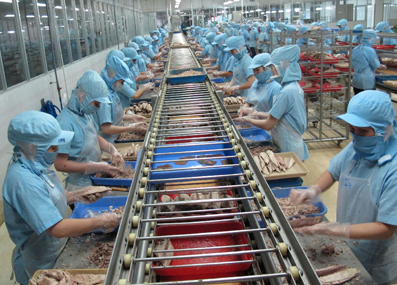* New generation FTAs to help limit trade deficit: By the end of 2014, Vietnam has joined eight free trade agreements (FTAs), including six with other ASEAN countries and the bloc’s partners and two bilateral FTAs with Japan and Chile. At present, the country is negotiating seven FTAs, including the Trans-Pacific Partnership Agreement (TPP) and the Vietnam-EU FTA which aim a higher level of liberalization.
Deputy Minister of Industry and Trade Tran Quoc Khanh said the involvement in FTAs had exerted positive impacts on export revenues, gradually reducing trade deficit. With new generation FTAs like TPP, Vietnam is likely to become a component of the global value chain, expand its export markets and better control the import-export structure.
Such new FTAs also help Vietnam complete its market economic mechanism, promote domestic investment, attract foreign investment, and improve business competitiveness.
Under Government Resolution No. 19/2015/NQ-CP, within the framework of the concluded FTAs, the Ministry of Industry and Trade has been assigned to apply rational tariff and non-tariff measures to limit the import of non-essential consumer goods and goods that are domestically available in order to stimulate domestic production and restrict imports from some markets.-
* Important contents of the state capital law need to be detailed: The Government and relevant ministries will soon detail seven major contents of the law on management and use of state capital invested in production and business of enterprises that will take effect on July 1, said the Ministry of Finance.
They include investment of state capital to establish enterprises and the mechanism for the State to place orders for goods or services from enterprises functioning to help regulate the macro-economy and ensure social security; order and procedures for investment of state capital to establish enterprises; order and procedures for charter capital supplementation for operating enterprises; additional investment of state capital to maintain the State’s holding rate in joint-stock companies or limited liability companies with two or more members; order and procedures for using state capital to purchase part or whole of enterprises; roadmap for divestment of state capital from enterprises; and financial management of enterprises of which charter capital is wholly held by the State.
The Ministry of Finance has drafted a decree to regulate investment of state capital in enterprises and management and use of capital and assets in enterprises. The decree covers the investment of state capital to establish state enterprises; supplementation of charter capital of operating state enterprises; management of capital and assets in state enterprises; and management of state capital at joint stock companies or limited liability companies with two or more members.-
* Numerous tax, customs procedures remain to be trimmed: The Ministry of Finance has recently issued two decisions approving the removal or simplification of 46 administrative procedures in the taxation and customs fields.
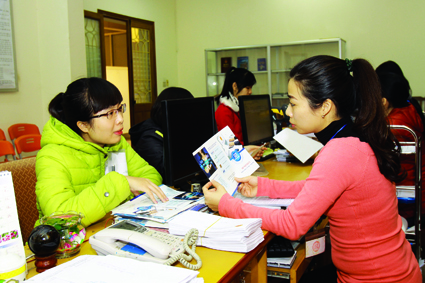 |
Answering inquiries of taxpayers at the Public Information and Taxpayer Assistance Division of Hai Phong Tax Department __Photo: Hoang Hung/VNA |
These decisions come in furtherance of Government Resolution No. 19/2015/NQ-CP dated March 12 on major tasks and solutions for improving the business environment and national competitiveness.
Accordingly, six of the 46 procedures will be removed (one in taxation and five in customs), while the remaining 40 administrative formalities will be simplified, including seven in taxation and 33 in customs.
Specifically, procedures for replacement of customs declarations will be eradicated because contents of such procedures are specified in procedures for cancellation of customs declarations.
The ministry will also wipe out procedures for liquidating declarations for import of materials for export production under Article 60 of the 2014 Customs Law. Under the new regulations, the liquidation will be replaced with the management and inspection of settlement reports and post-customs clearance inspection.
Procedures for notification, adjustment and inspection of norms for goods processed for foreign traders and for registration and inspection of norms of goods processed for foreign traders will also be removed in line with Articles 59 and 60 of the 2014 Customs Law.
Under the Resolution, the average tax payment time will be shortened to under 121.5 hours per year, the percentage of local enterprises conducting online tax declaration will be over 95 percent, and the rate of enterprises paying corporate tax via network will be at least 90 percent.-
* SOE equitization to be accelerated: Prime Minister Nguyen Tan Dung has ordered drastic measures be taken to complete the equitization of 289 State-owned enterprises (SOEs) in this year.
Accordingly, 52 companies, which have had their value determined, must be equitized in the second quarter of the year. The equitization of 126 SOEs, whose value was being accounted, will be completed in the third quarter of the year; 82 others must hasten their valuation in the second quarter and be available to investors by the year-end.
The PM emphasized the necessity to ensure the benefits of the State, employees and shareholders, adding that the restructuring of SOEs must help improve their operational efficiency.
Within this month, checks would be implemented on SOEs, which saw a high rate of unsold shares at initial public offerings and planned to adopt measures for another share sale.
In addition, the divestment of state capital from non-core business lines must be placed under tight control to ensure efficiency. To date, Vietnam had collected a total of more than VND 7 trillion (USD 328.6 million) from divesting non-core businesses, 45 percent of which came from the real estate sector.
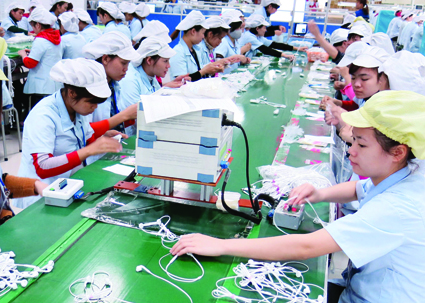 |
Manufacturing smart phone earpieces in Samsung’s Glonics Vietnam Company Limited in Thai Nguyen city __Photo: Hoang Nguyen/VNA |
The Ministry of Finance was ordered to guide the settlement of bottlenecks in enterprise valuation to accelerate the equitization process.
According to the Prime Minister, ministers, state agency leaders, chairpersons of provincial-level People’s Committees and economic group general directors must be held accountable for the outcomes of restructuring, equitization and divestment of SOEs under their management.
* Twenty-one business lines still lack business conditions: Among 267 conditional business lines and trades, business conditions have yet been specified for 21 sectors though the revised Investment Law will take effect soon, deputy director of the Ministry of Planning and Investment’s Foreign Investment Agency Nguyen Noi said at a seminar on business conditions on April 6.
To date, the Ministry of Planning and Investment has reviewed and made statistics on conditions for almost all conditional business lines and trades and will soon post a draft document prescribing on such conditions on the national business registration portal to collect people and enterprises’ opinions.
Director of the Central Institute for Economic Management Nguyen Dinh Cung said the responsibility to prescribe business conditions rests with management agencies, but not people and enterprises. Where business conditions are not available, people and enterprises are entitled to continue their business operations and it is unnecessary to suspend the grant of business licenses to enterprises lawfully engaged in conditional business lines for state management reason, he added.-
* Customs offices pledge to complete physical inspection within eight hours: The General Department of Customs has recently pledged to shorten time required for completion of customs procedures.
Accordingly, customs offices will complete examining customs dossiers within two working hours after receiving complete and valid dossiers. The time limit for physical inspection of goods is eight working hours after customs declarants produce all goods subject to inspection to customs offices.
For shipments of goods in large quantities and of various categories or in case the inspection is too complicated, the duration for physical inspection of goods may be prolonged to no more than two days.
Customs offices also pledge to give tax exemption to organizations and individuals within 10 working days after receiving complete dossiers.-
* Japanese imports to enjoy zero tariff: Thousands of products imported from Japan into Vietnam will enjoy zero percent duty from April 1, according to the Ministry of Finance.
Under Circular No. 25/2015/TT-BTC, 3,234 tax lines, or 33.8 percent of the total tariff, will be subject to the zero percent duty, once the Vietnam-Japan Economic Partnership Agreement for the 2015-2019 period is implemented.
Products eligible for the new duty rates include plastic materials, chemicals, machinery and equipment, tools, computers, electronic appliances and spare parts, fibers, textile and garment materials and accessories, footwear and pharmaceuticals.
Besides, 354 products not subject to the preferential tariff policy will be taxed under the current Most Favored Nation (MFN) regime.
As of April 1, 2,874 products from Japan (30 percent of the total tax lines) will be subject to the zero duty under the ASEAN-Japan Comprehensive Economic Partnership (AJCEP) during 2015-19.-
